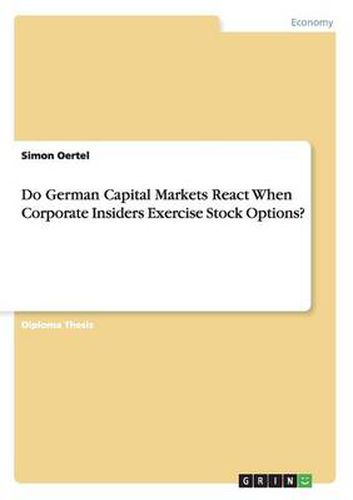Readings Newsletter
Become a Readings Member to make your shopping experience even easier.
Sign in or sign up for free!
You’re not far away from qualifying for FREE standard shipping within Australia
You’ve qualified for FREE standard shipping within Australia
The cart is loading…






Diploma Thesis from the year 2007 in the subject Business economics - Business Management, Corporate Governance, grade: 1,7, University of Tubingen, language: English, abstract: Trading by corporate insiders in their company’s stock and the impact of insider trading on capital markets has long been a field of interest for academics as well as policy makers and regulators who aim to guarantee the effectiveness and fairness of capital markets. Outside investors are following corporate insiders’ trading behavior closely and might intend to mimic their trading strategies, trying to realize abnormal profits. Newspapers and information services regularly report insider trading activity.3 The term insider trading will generally be used to describe trading by corporate insiders. It does, however, not necessarily imply illegal behavior. Corporate insiders might trade for a multitude of reasons which do not have to include the illegal exploitation of inside information. The definition of corporate insiders might differ from country to country and their corresponding regulations. The differences in the definition of corporate insiders between the US, the UK, and Germany will later be explained.The academia has provided a multitude of papers on insider trading over different decades (e.g., Jaffe (1974), Seyhun (1986), Rozeff and Zaman (1998), and Lakonishok and Lee (2001)) and research has been conducted to analyze the effects of insider trading on different countries’ capital markets (e.g., Jeng et al. (2003) for the US, Fidrmuc et al. (2006) for the UK, Eckbo and Smith (1998) for Norway, and Betzer and Theissen (2005) for Germany). The majority of research publications, however, excludes stock option exercises from the analysis. The reasons for the exclusion of stock options are versatile. Early papers on insider trading exclude the exercises due to the complexity of identifying reasons for the exercise of stock options4 or the difficulty of getting price information associat
$9.00 standard shipping within Australia
FREE standard shipping within Australia for orders over $100.00
Express & International shipping calculated at checkout
Diploma Thesis from the year 2007 in the subject Business economics - Business Management, Corporate Governance, grade: 1,7, University of Tubingen, language: English, abstract: Trading by corporate insiders in their company’s stock and the impact of insider trading on capital markets has long been a field of interest for academics as well as policy makers and regulators who aim to guarantee the effectiveness and fairness of capital markets. Outside investors are following corporate insiders’ trading behavior closely and might intend to mimic their trading strategies, trying to realize abnormal profits. Newspapers and information services regularly report insider trading activity.3 The term insider trading will generally be used to describe trading by corporate insiders. It does, however, not necessarily imply illegal behavior. Corporate insiders might trade for a multitude of reasons which do not have to include the illegal exploitation of inside information. The definition of corporate insiders might differ from country to country and their corresponding regulations. The differences in the definition of corporate insiders between the US, the UK, and Germany will later be explained.The academia has provided a multitude of papers on insider trading over different decades (e.g., Jaffe (1974), Seyhun (1986), Rozeff and Zaman (1998), and Lakonishok and Lee (2001)) and research has been conducted to analyze the effects of insider trading on different countries’ capital markets (e.g., Jeng et al. (2003) for the US, Fidrmuc et al. (2006) for the UK, Eckbo and Smith (1998) for Norway, and Betzer and Theissen (2005) for Germany). The majority of research publications, however, excludes stock option exercises from the analysis. The reasons for the exclusion of stock options are versatile. Early papers on insider trading exclude the exercises due to the complexity of identifying reasons for the exercise of stock options4 or the difficulty of getting price information associat